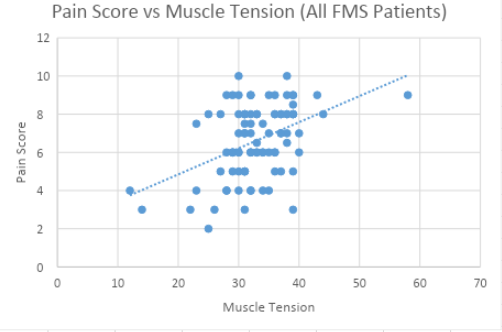Session Information
Session Type: Poster Session (Sunday)
Session Time: 9:00AM-11:00AM
Background/Purpose: Previous research has found that muscle pressure as measured by a pressure gauge is three times higher in the trapezius muscle in fibromyalgia patients compared with non-fibromyalgia controls. We evaluated patients with fibromyalgia to determine whether there is a correlation between pain scores based on visual analog scale (VAS) 0 to 10 and the muscle pressure.
Methods: Patients signed a consent form if they were willing to have a muscle pressure measured by inserting a 22-gauge needle into the left trapezius muscle. After consent from patient, a trained nurse or physician experienced in determining muscle pressure performed the procedure and found the muscle pressure in mmHg. The muscle pressure was then correlated with the pain score of 0 to 10.
Results: For this analysis, all subjects (N=180) – regardless of diagnoses – were combined together in order to assess the correlation between the muscle tension and pain scale scores. Subjects had a median age of 47 years (range 20- 75 years), 81% were female. 79% had a diagnosis of fibromyalgia syndrome (FMS), followed by 7% having a diagnosis of rheumatoid arthritis. FMS patients had a median age of 49 years (range 20 to 75 years); 84.5% were female and 15.5 % male. In the non-FMS group (non-FMS rheumatic disease patients and controls) the median age was 45 years (range 24 to 68 years); and 68.4% were females and 31.6 % males. 142 patients had fibromyalgia and their mean (SD) pain score was 6.6 (1.84) on a 0-10 VAS. The mean (SD) pain score in the non-FMS subjects was 0.7 (1.26). The mean (SD) total population pain score was 5.5 (2.91). The calculated Pearson correlation coefficient for muscle tension vs pain scale for 175 subjects was 0.8312 (R-squared 0.6909; p-value < 0.0001). This indicates a highly significant association between subject’s muscle tension and pain scores.
Conclusion: These findings demonstrate that muscle pressure directly correlates with pain scores, and this provides further evidence that muscle pressure may be the cause of much of the pain in fibromyalgia. Attempts to reduce muscle pressure with medication or other treatments could be successful in reducing pain in patients with fibromyalgia.
To cite this abstract in AMA style:
Katz Small A, Small B, Anilao J, Polyak Wokurka J, Katz R. Muscle Pressure Correlates with Pain Levels in Fibromyalgia Patients and Muscle Tension May Be the Cause of Their Pain [abstract]. Arthritis Rheumatol. 2019; 71 (suppl 10). https://acrabstracts.org/abstract/muscle-pressure-correlates-with-pain-levels-in-fibromyalgia-patients-and-muscle-tension-may-be-the-cause-of-their-pain/. Accessed .« Back to 2019 ACR/ARP Annual Meeting
ACR Meeting Abstracts - https://acrabstracts.org/abstract/muscle-pressure-correlates-with-pain-levels-in-fibromyalgia-patients-and-muscle-tension-may-be-the-cause-of-their-pain/



